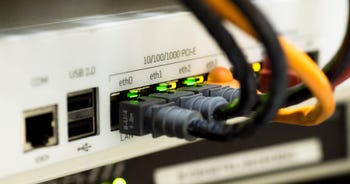The Bionic guide to guest WiFi for business
For some businesses, guest WiFi is now an essential part of the customer experience. If you work in hospitality - running a café or hotel for example - most customers will expect a good quality guest WiFi connection. Even if you are office-based and have regular meetings, it may be worth getting guest WiFi to allow visitors to get online quickly and safely.
And a guest WiFi network for your business isn’t just a nice thing to be able to offer customers or clients when they visit you, it is also an important part of your IT security package.
However, setting up guest WiFi isn’t always as straightforward as you might imagine. There are a number of things to consider both for the safety of your business and your visitors.
This guide will help you understand more about guest WiFi and how to set up your network.
What is guest WiFi?
Guest WiFi is a separate WiFi network that is available for visitors to your business, as opposed to your employees.
Technically, a guest WiFi network is a separate access point on your business’ broadband router. It connects guests to a different point from your internal network, meaning they will have easy internet access without being able to access any of your data or files.
Guest WiFi may also give you improved security, as malware or other viruses that happen to be on a guest’s device will not be able to get into your business network or corrupt your files.
Why offer guest WiFi?
In today’s world, customers in cafés, restaurants, hotels or even shops will expect to be able to browse the internet for free in those locations. Offering guest WiFi is the best way of allowing them to do so. It may seem obvious, but customers who find it easy to get online are likely to spend more time - and money - in your business.
But even office-based businesses may find it useful to have a guest WiFi network. Guest WiFi provides better security and, sometimes, a more reliable connection for your visitors.
Why do companies have a guest Wi-Fi?
There are a lot of reasons why companies choose to get guest Wi-Fi. The main reason is for security. Offering a guest Wi-Fi network can help protect your business network and control who has access to things like your business computers, printers and servers.
How do I secure my guest Wi-Fi?
The main way to secure your business guest Wi-Fi is to password protect it. To do this, follow the below instructions:
- Enter your router's IP address into the search bar of your internet browser
- Log into your router as admin
- Locate the guest network settings
- Enable guest WiFi access
- Create your guest WiFi network name
- Set up a guest WiFi password and save your new settings
Does guest Wi-Fi cause interference?
Guest WiFi is the safest way to give customers access to the internet through your existing network and no, it shouldn't cause much interference.
Customers using guest Wi-Fi will be on the same network sharing bandwidth, but will be isolated to their own network. It will use the same bandwidth as if they were connected to your main network.
How to set up a guest network
Setting up a guest WiFi network is relatively easy to do once you have all the right things in place. First of all, you will need to make sure you have a broadband connection that can handle multiple networks and potentially large numbers of users logging on at the same time.
It is probably worth investing in unlimited broadband for your business, as this will allow for unlimited downloads and multiple connections. You also want to make sure your broadband is as fast as possible - especially if your business is in the hospitality sector, where consumers have come to expect a quick, reliable connection.
Once your broadband and router are in place, you will need to set up separate local networks for staff and guest access. You can assign a section of your bandwidth to each network, which can be adjusted depending on how many users for each network you are expecting.
Alternatively, you could get a hotspot gateway to allow guests to access secure WiFi. You will need to install WiFi hotspot gateway software, or buy hardware - such as a router - with the software already installed.
Through a gateway, users will connect to your native WiFi network and get taken to a ‘captive portal’ on their browser, where they will be asked to enter their email or provide a password. Although it may be a more expensive solution, it is more secure and provides an extra layer of legal protection to boot.
How to secure guest WiFi
Knowing how to secure your guest WiFi is extremely important, especially if you are giving the general public access to the network. But luckily there are only a few steps you have to take before your visitors can browse safely.
The first thing to do is to make sure that ‘WPA2’ level security is enabled. This is the latest and safest level of WiFi security and should come as standard with most modern routers. To enable WPA2 security, you will also need to know how to disable WPS (WiFi protected setup). This is a system that makes connecting to a secure network easier for new devices without needing to set up a password. However, WPS is notoriously insecure, especially if lots of people will be connecting to your network. Most modern routers should allow you to disable WPS fairly easily and this is normally the safest option.
Other security measures you might want to have in place for a guest WiFi network include: installing additional firewalls; keeping the router out of sight so no one can plug directly into it; and adjusting your WiFi signal strength so it only covers your business premises.
How to put a password on guest WiFi
Aside from the security measures mentioned already, you might also want to put a password on your guest WiFi and change it regularly. This can usually be done for the separate network you have created under that network’s name.
First, you need to enter your router’s IP address into a browser and log in as admin. You will then be able to enable guest WiFi, enter the guest network’s name and choose a password.
As most business broadband providers will offer a higher level of technical support than standard domestic providers, you can always call customer service if you have any problems setting up the network.
Things to consider when setting up guest WiFi at your business
The first thing to think about when setting up guest WiFi for your business is whether it is something you definitely need. While it is nice to have for many types of business, it can also be expensive and compromise your cybersecurity.
If you do think you want guest WiFi, consider how you would like to set it up, how fast your connection needs to be for the number of users you are likely to have, and how much you are prepared to pay.
Bionic’s team of experts can help you answer all of these questions, and more. So give us a call today to discuss your business’ guest WiFi needs.









